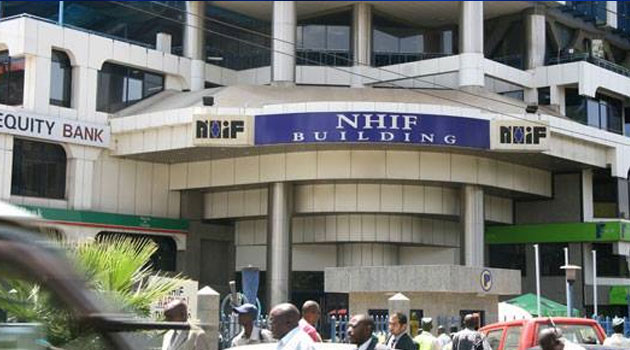
Currently only 6.2 million people are registered with NHIF. Of those only four million are consistent in their monthly contributions/FILE
NAIROBI, Kenya, Jan 20 – At least 12 million people in the informal sector are yet to register for the National Hospital Insurance Fund (NHIF).
In an interview with Capital FM News, CEO Geoffrey Mwangi said the statistics are worrying but they are working on programmes to capture all those not in the scheme.
“The huge gap lies in the informal sector. We need to do more to increase the number of people in the health scheme,” said Mwangi.
“That’s why we are rolling out programmes to create awareness and educate the public on the importance of insuring one’s health.”
Currently only 6.2 million people are registered with NHIF. Of those only four million are consistent in their monthly contributions.
Some 2.2 million people who are consistent in their contributions account for those in formal employment.
“The figure for those registered with NHIF is over six million but that figure keeps changing because there are those who have registered but stop making their contributions along the way,” noted Mwangi.
Last year NHIF reviewed its benefits introducing a new package that would see patients suffering from chronic diseases such as diabetes, hypertension and cancer get covered.
It is worth noting that the reviews to the NHIF benefits have tremendously helped address challenges in regards to access to medical treatment as well as help defray some of the bills and also prevent hospitals from incurring losses due to patients’ inability to pay for their medical expenses.
But with a million plus on the cover, abject poverty and ignorance remains stumbling block to many who lack the crucial card.
With the minimum monthly payment pegged at Sh150, majority find it unaffordable as is the case with Susan Muthoni Kariuki whom together with her husband depend on casual employment to get by in life.
Five months into acquiring the NHIF card, Muthoni was diagnosed with Arthritis a disease that causes painful inflammation and stiffness of the joints making her unable to attend to her farm and crocheting business.
She was later diagnosed with diabetes, cataracts of which by the help of medical camps by the Safaricom foundation at Loitokitok was able to access treatment and a surgery done to restore her sight.
She would soon regain her eyesight and most of all gain access to the much needed treatment.
Muthoni’s case is just one of the many cases that face the destitute and vulnerable in Kenya.
A look at the contributions to the NHIF scheme shows that individuals earning Sh5,999 and below contribute Sh150, those earning Sh100,000 and above pay the highest amount of Sh1,700 while those in self-employment Sh500 per month.
So how will the destitute who are not assured of their next meal or employment access the crucial medical card?
“We have a programme for vulnerable groups ,” said Mwangi, ” The programme runs under the Ministry of Social Services (labor social, security and services) which documents those who are widowed, the orphans, street families and those who are clearly not in a position to make monthly contributions to the insurance fund.”
The programme currently covers at least 200,000 households in the country with more efforts being put in place to increase the number.
Mwangi says the general uptake of the NHIF card has been good.
“We have boosted efforts to ensure that cases like that of Muthoni’s will be a thing of the past. This is in line with increasing awareness, educating the public on the significance of having a medical cover,” stated Mwangi.
Meanwhile, NHIF is currently running a programme that would see at least 1000 patients diagnosed with cardiac conditions receive surgery in public health institutions.
“We have so far carried out 50 surgeries on heart related conditions especially those who cannot afford the procedure,” noted Mwangi, “Since they are our members we look forward to have a normal curving in that area and see to it that no one suffers due to lack of treatment.”
The programme will help offset the backlog of over 1000 patients who have been diagnosed with heart related ailments and awaiting treatment.
The surgeries will be carried out in all public health facilities to name a few the Kenyatta National hospitals, Coast general hospital, Nairobi hospital, Aga Khan hospital, Tenwek hospital in Bomet, Karen hospital.
“The surgeries carried out have been successful except for one fatality recorded in Mombasa but generally the outcomes have been positive,” said Mwangi.
The surgical procedures are being carried by a team of local doctors in collaboration with NHIF and the ministry of health.
“By involving our local doctors, we are actually boosting our local capacity,” cited Mwangi, “We are hoping that by this year we would have addressed all the 1000 heart related cases awaiting surgical procedures.”
The programme is also meant to promote local treatment of heart related problems and reduce the number of Kenyans seeking treatment in foreign countries.
Mwangi said they are also looking at reviewing the Kidney treatment package to address the rising cases of the disease in country.
“We have a package for it and we want to see improvements done on it,” cited Mwangi, “Other than that we have more than enough expertise locally that can treat kidney complications.”
“We have acknowledged the increase in exposure to chronic conditions being experienced in the country and have decided to improve these packages, “he assured.
Mwangi called on all Kenyans to register for NHIF as the benefits are enormous.
“We should avoid the culture of ‘harambees’ when you fall sick, let the card take care of you and your family when you fall sick.”














































